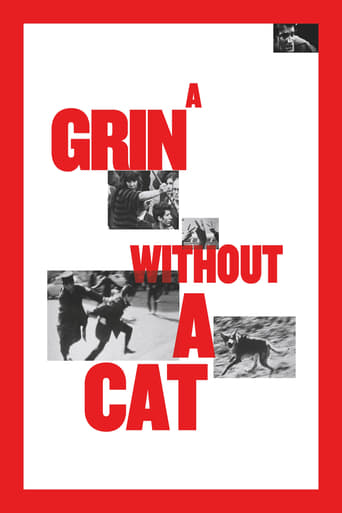invaderJim
When he officially abandoned the New Wave, Godard said that he no longer wanted to make "political films" but instead wanted to "make films politically." In Grin Without a Cat, Chris Marker manages to do both by presenting a Weberian genealogical analysis of revolution, and in doing so creates a more perfect kind of documentary. Focusing on specific events and individuals in an overarching context, he attempts much more than most political documentaries. He doesn't ask the question "How was the revolution successful or unsuccessful?" (although this is addressed), but the main inquiry is instead "Where does revolution come from, and once it's here, what function does it serve?" The breadth of the film is incredible, chronicling popular revolts in France, Vietnam, Cuba, Prague, Chile, Bolivia, China and others, but as many who have seen the film note, it moves incredibly fluidly, and the time spent watching it never seems to drag. There is also no lack of the flair of style seen in Marker's most popular works, Sans Soleil and La Jetee. In short, anyone with an interest in the documentary form will tremendously enjoy this film, though it is a bit depressing. Like politics itself, there are no heroes presented, only victims, oppressors, and the idealistically misinformed.
carlitaantonini
As always Marker give us a breathtaking beautiful movie to shake our minds and think about the world around us. Its sad to realize through the images that even when the movie is about the history of 50 years back now, the ideologies, the problems and the unfairness of the world remains pretty the same. The compilation of images, documents, videos, interviews is excellent. How can Marker be everywhere and always in the right moment? Just because is Marker I guess. Excellent movie for people of any age or nationality in the mood of caring about the society and enjoying Marker's mastery using the video as a real communicator of deep thoughts.
palmiro
I saw the English-language version, so I missed out on the wonderful voices of Yves Montand and Simone Signoret. Still, the film has provocative images (makes you think how difficult it really is to "make the revolution" in advanced capitalist countries) and my attention never flagged. But for someone who does not approach the film fully equipped with all of the political-cultural paraphernalia of the French left, the film is a bit bewildering. It's not at all clear what the director's point of view is, and this is unfortunate for a film that attempts to make sense of a relatively well-defined political phenomenon: the new left of 1968 and beyond. Is he simply trying to say that the movement strayed too far from its working class ally, and therefore was a superstructure without a base (hence, the title)? If so, the film is not organized in a sufficiently coherent way to bring that point home. And even so, one could hardly say that the French left really had a chance in '68 to "smash the bourgeois state," given that the violent instruments employed by the state to perpetuate in extremis the "dictatorship of the bourgeoisie"(the army and the police) never showed signs of cracking. And even if there had been a "revolutionary socialist breakthrough" in France, the country would have been crushed first by the economic sanctions imposed by the other capitalist countries (a la Chile) and then militarily (had the "revolutionary government" sought to align itself with the USSR). Very humorous interlude involving Fidel's obsessive massaging of microphones, but on the whole not very flattering towards him (but neither towards Guevara and Regis Debray, for that matter). Maybe I missed something, but I thought Georges Marchais (PCF) came off the best--judge for yourself.
carlospavan
This is Chris Marker's three hour elegy to the New Left and the contradictions that swept the world in 1967 and 68. Divided in two parts, Marker covers Vietnam, Che's death, May 68, Prague, Chile and much more, connecting these images with Marker's comments about the downfall of the New Left.Each image is so powerful by itself. From a distorted Fidel giving a speech to a demonstration in Japan against a company that's poisoning the water. A true compilation of historical documents. It's three hours long, but it's worth it.



